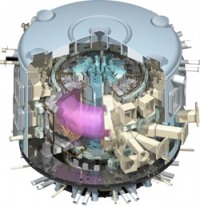The European Commission proposed yesterday a major additional cash injection of over €860 million ($1100 million) in funds for nuclear fusion demonstration as Europe's share of the cost of Iter doubles.
 |
| A cutaway shows the complexity of Iter's systems |
The proposed response – if accepted by the European Parliament and EU Council of Ministers – will help ease this problem. Its first step will be an initial transfer of unused funds of €400 million from other EU budgets to Iter. The commission said it would also request an additional transfer of money when negotiating next year's EU budget, starting with detailed talks with MEPs and ministers in November. Looking ahead, it is proposing a redeployment of €100 million in 2012 and €360 million in 2013 from the EU's main research spending budget, the Seventh Framework Program.
EU budget commissioner Janusz Lewandowski and research commissioner Máire Geoghegan-Quinn said: "Iter can provide a safe, clean and inexhaustible source of energy for the future. This is an immense prize – especially when you consider that the EU had a trade deficit in energy of nearly €400 billion in 2008. The EU needs to show the vision and the resolve beyond the immediate financing difficulties and meet its international commitment to this project."
The revision has been necessary because of substantial overall cost increases for Iter, which have more than doubled the costs for Europe from the initially expected €2.7 billion. The other partners are China, India, Japan, South Korea, Russia and the USA. Europe and Japan fought to host the project with Japan taking the consolation prize of a materials testing facility vital to later power-generating fusion efforts.
One Brussels study on Iter costings points out the 2001 estimate for Iter's construction was €5.9 billion, of which the EU's Euratom budgets were supposed to fund €2.7 billion (€1.7 billion in kind with components and systems and €945 million in cash). Today, the commission admitted there were "substantial overall cost increases for Iter, which have more than doubled the costs for Europe."
However, the commission points out the inflation of current cost estimates from the European Joint Undertaking for Iter, 'Fusion For Energy', which is coordinating the European role in the project. Its current assessment for European contributions alone to the project under the 2007-2020 construction schedule is €6.6 billion ($8.4 billion) for building works and €650 million for running costs and other activities.
"These estimates would require a Euratom contribution of €5.9 billion ($7.5 billion)," said the commission. Examining budgets commitments for 2012 and 2013, there is a shortfall. Programmed Iter spending in the EU's 2007-13 medium term spending plan includes just €346 million for 2012 and €344 million for 2013. This means, said the commission: "Euratom is facing an estimated gap on commitment appropriations of about €1.4 billion for the years 2012-2013 (€550 million in 2012 and €850 million in 2013)."
A new Brussels report on general spending pressures for the EU shows this could be a tough circle to square. A review of the EU's 'inter-institutional agreement on budgetary discipline and sound financial management' confirms "estimated additional commitment appropriations for Iter to be provided by the EU budget under the present [2007-13 budget plans] might be well above one billion euro."
This might demand a rewriting of the medium-term spending program as regards key budget heading 1A, which covers immediate spending demands for boosting European economic competitiveness and job creation. Iter is a key priority here and the report said this budget heading "is regularly under pressure due to the evolving context of global challenges," notably because of programm whose "additional financial needs still have to be determined (for example on Iter)."
It continued: "The potential amounts at stake decisively exceed amounts anticipated to remain unspent/uncommited under the current ceiling of heading 1A and there is no budgetary room for new initiatives." And Iter is far from being the only financial suiter. Other competing priorities include the Galileo global positioning satellite program, the European Institute of Innovation and Technology, energy sustainability programs and the decommissioning of Bulgaria's Kozloduy nuclear power plant, among others.
With these financial pressures taken into account, only €50.1 million in 2011, €34.6 million for 2012 and €47.8 million for 2013 is left in this particular pot for additional unexpected spending, for example on Iter. Negotiations would be required to transfer more money to Iter, and unless there is an unexpected underspend in the EU budgets elsewhere – for instance on agriculture – some tough political choices could be required to find Iter the money it needs.
By Keith Nuthall
for World Nuclear News




_47120.jpg)
_23621.jpg)

_63865.jpg)





